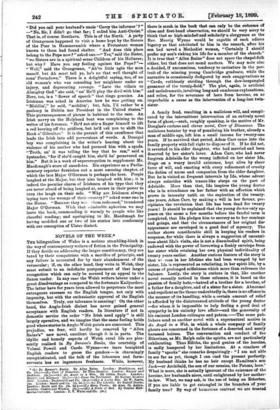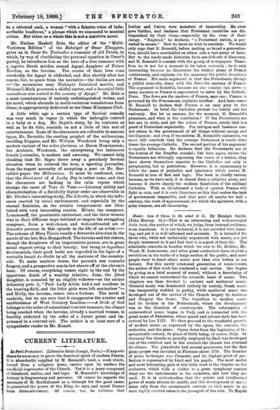NOVELS OF THE WEEK.*
THE bilingualism of Wales is a serious stumbling-block in the way of contemporary writers of fiction in the Principality. If they decide on addressing the larger constituency, they are taxed by their compatriots with a sacrifice of principle, and any failure is accounted for by their abandonment of the vernacular ; if, on the other hand, they write in Welsh, they must submit to an indefinite postponement of that larger recognition which can only be secured by an appeal to the Saxon reader. In any case the Welsh writers labour under a great disadvantage as compared to the fortunate Kailyarders. The latter have for years been allowed to perpetrate the most outrageous excesses on the English tongue, not only with impunity, but with the enthusiastic approval of the English themselves. Truly, our tolerance is amazing! On the other hand, the Ang]o-Irish dialect has never gained general acceptance with English readers. In literature if not in domestic service the order "No Irish need apply" is still largely operative, and we imagine that the same feeling holds good where stories in Anglo-Welsh patois are concerned. This prejudice, we fear, will hardly be removed by Allen Raine's" new novel, excellent though it is in parts. The idyllic and homely aspects of Welsh rural life are plea- santly realised in By Berwen's Banks, the courtship of Valmai Powell and Cardo Wynne—we leave benighted English readers to guess the genders — is charmingly unsophisticated, and the talk of the labourers and farm-
servants has an ingenuous freshness. While, however,
• (1.) By Berrwen's Banks. By Allen Raine. London: Hutchinson and Co. 09.3—(2.) Carr ri Dimecaur. By Theo Dough=. London Harper and Brothers. [6s.]—(S.) An Angel in a Web. By Julian Ralph. London : Harper and Brothers. (63.3—(4.) Omar the Tentmaker. By Nathan Haskell Dole. London: Duckworth and Co. (6s.)—(5.) A Lucky Dog. By W. Sapte, zan. London: Sands and Co. [3s. 6,14—'6.) The Libretto. By Rudolf Direke. London Sands and Co. [3s. 6d.]—(7.) Mary Unwin. By Alan St. Aubyn. London r Chatto and Windus. [6s.]—(S.) A Bride of God. By Conrad klaw• thyme Corroder. London: F. V. White and Co. Lt4.]
there is much in the book that can only be the outcome of close and first-hand observation, we should be very sorry to think that so high-minded and scholarly a clergyman as the Rev. Meurig Wynne would be capable of such odious bigotry as that attributed to him in the remark, after his son had saved a Methodist woman, " Certainly I should prefer my son's risking his life for a member of the church." It is true that "Allen Raine" does not spare the chapel-folk either, but that does not mend matters. We may note also a decided, if unconscious, tendency to caricature in the por- trait of the mincing young Cambridge graduate, while tho narrative is occasionally disfigured by such exaggerations as "Cardo, ruthlessly striding through the dew-bespangled gossamer of the turnip-field." The plot, again, is artificial and melodramatic, involving long and cumbrous explanations, and relies, for the severance of hero from heroine, on so improbable a cause as the intervention of a long-lost twin- sister.
A family feud, resulting in a malicious will, and compli- cated by the intermittent intervention of an entirely novel form of ghost,—such, roughly speaking, is the motive of Mr. Douglas's curious and clever novel, Carr of Dinisealtr. The malicious testator by way of penalising his brother, already a man of middle age, left him a small income for twenty-one years. If he survived that period, Adam Carr came into the family property with full right to dispose of it. If he did not, it reverted to his elder daughter, who had married and been deserted by her sister's lover. Adam Carr, who had never forgiven Adelaide for the wrong inflicted on her sister Ida, drags on a weary invalid existence, kept alive by sheer force of will, and exacting with every refinement of cruelty the duties of nurse and companion from the elder daughter. But he is visited at frequent intervals by Ida, whose advent always coincides with trance-like sleeps on the part of Adelaide. More than that, Ida inspires the young doctor who is in attendance on her father with an affection which grows in intensity until, on the expiration of the twenty one years, Adam Carr, by making a will in her favour, pre- cipitates the revelation that Ida has been dead for twenty years ! It should be explained that the young do"tor only ap- pears on the scene a few months before the fateful term is completed, that Ida pledges him to secrecy as to her comings and goings, and that the circumstances of her original dis- appearance are enveloped in a good deal of mystery. The author shows considerable skill in keeping his readers in suspense, for while there is always a suggestion of uncanni- ness about Ida's visits, she is not a disembodied spirit, being endowed with the power of borrowing a fleshly envelope from her sister while retaining her own physical individuality of twenty years earlier. Another curious feature of the story is that sv, reas in her lifetime she had been wronged by her sister, Ida is represented as retaliating, in her spirit life, by a course of prolonged selfishness which more than redresses the balance. Lastly, the story is curious in that, like another novel recently noticed in these columns, it is based on the passion of family hate,—hatred of a brother for a brother, of a father for a daughter, and of a sister for a sister. Abnormal and repellent as the theme undoubtedly is, there is no offence in the manner of its handling, while a certain amount of relief is afforded by the disinterested attitude of the young doctor —for whom it is impossible to help feeling a good deal of sympathy in his unlucky love affair—and the generosity of his eminent London colleague and patron.—The same pub- lishers send us another novel with a supernatural motive in All Angel in a Web, in which a whole company of family ghosts are concerned in the fortunes of a deserted and sorely harassed heiress. The conversation and conduct of the Etherians, as Mr. Ralph calls the spirits, are not particularly exhilarating. Thus Editha, the good genius of the heroine, is sadly hampered by her limitations. At a conclave of family "spooks" she remarks despairingly : "I am not able to see far as yet, though I can aead the present perfectly. My husband thinks he has no heir except Hamilton's son Jack—or Archibald, the son of our cousins, the Patons, here.' What is more, she is actually ignorant of the existence of the heroine, her husband's niece, until enlightened by her mother- in-law. What, we may ask, is the use of being an Etherian, if you are liable to get entangled in the branches of your family tree? By way of humorous contrast we are treated to a coloured cook, a woman " with a falsetto voice of inde- scribable headiness," a phrase which we commend to musical critics. But taken as a whole this knot a nutritive novel.
Mr. Nathan Haskell Dole, the editor of the " Multi- Variorum Edition" of the Rubaiyat of Omar Khayyam, gives us in Onicir the Tentmaker a romance of old Persia, in which, by way of elucidating the personal equation in Omar's poetry, he introduces him as the hero of a love romance with a captive Greek maiden named Agape, daughter of Prince Kreiton, as the heroine. The course of their love runs crookedly, for Agape is abducted, and dies shortly after her rescue, but, to quote from the narrative—the italics are ours —" the mountains near Nishdpiir furnished marble, and Nizamu'l-Mulk procured a skilful carver, and a beautiful little mausoleum was erected to the memory of Agape." Mr. Dole is a most conscientious if entirely undistinguished writer, and his novel, which abounds in multi-variorum translations from Omar, is appropriately dedicated to the Omar Khayyam Club.
A little while ago a certain type of farcical comedy was very much in vogue in which the imbroglio centred in a baby or a dog. Mr. Sapte's story, by its contents as well as by its title, reminds us not a little of this sort of entertainment. Some of the characters are referable to ancient types, Mr. Barrable, the canting prophet of the millennium, recalling Stiggins, and Mr. William Woodcock being only a modern variant of the miles gloriosus, or Baron Munchansen ; but Atalanta Woodcock, the enterprising but indiscreet female journalist, is modern and amusing. We cannot help thinking that Mr. Sapte threw away a genuinely farcical situation when he relieved the hero, a sporting journalist, from the urgent necessity of accepting a post on Mr. Bar- rable's paper. the Millennium. It must be confessed, also, that the denoilment of A Lucky Dog is rather tame, and that the characters are lacking in the calm repose which stamps the caste of Vere de Vere.—Literary ability and characterisation of a decidedly higher order are observable in Mr. Dircks's interesting study, The Libretto, in which the influ- ences exerted by social environment, and especially by the eternal feminine, on the artistic temperament are illus- trated with very interesting results. Milner, the composer, Lomonosoff, the pessimistic enthusiast, and the three women who in their different ways befriend or inspire the struggling composer, form a well-chosen and well-contrasted set of dramatis personx in this episode in the life of an artist.— The scheme of Mary Untein recalls a favourite situation in the novels of the late Mrs. Hungerford. The heroine and her sisters, though the daughters of an impecunious parson, are in great social request owing to their beauty; but being ex hypothesi detrimentals, their good looks are regarded in the light of a veritable beauty du diable by all the matrons of the country- side. To make matters worse, the parson's son commits forgery, and a prospective son-in-law sheers off at the eleventh hour. Of course, everything comes right in the end by the opportune death of a wealthy relative ; Jean, the jilted daughter, is consoled by an eligible widower—as the author delicately puts it, "Poor Lady Alicia had a sad accident in the hunting-field, and the little girls were left motherless "- and Molly, the heroine, comes into a fortune. -The novel is readable, but we are sure that it exaggerates the avarice and snobbishness of West Country families.—A Bride of God belongs to the order of sensational convent romance, the climax being reached when the heroine, already a married woman, is forcibly abducted by the order of a Jesuit priest and im- prisoned in a convent cell. The author is at least sure of a sympathetic reader in Mr. Kensit.







































 Previous page
Previous page